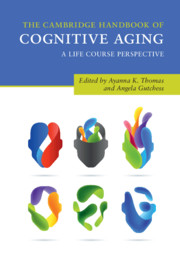Crossref Citations
This Book has been
cited by the following publications. This list is generated based on data provided by Crossref.
Mazerolle, Marie
Smith, Amy M.
Torrance, McKinzey
and
Thomas, Ayanna K.
2021.
Understanding Older Adults' Memory Distortion in the Light of Stereotype Threat.
Frontiers in Psychology,
Vol. 12,
Issue. ,
Montepare, Joann M.
and
Brown, Lisa M.
2022.
Age‐friendly Universities (AFU): Combating and inoculating against ageism in a pandemic and beyond.
Journal of Social Issues,
Vol. 78,
Issue. 4,
p.
1017.
Knowlton, Barbara J.
and
Castel, Alan D.
2022.
Memory and Reward-Based Learning: A Value-Directed Remembering Perspective.
Annual Review of Psychology,
Vol. 73,
Issue. 1,
p.
25.
Murphy, Dillon H.
and
Castel, Alan D.
2022.
Responsible Remembering and Forgetting in Younger and Older Adults.
Experimental Aging Research,
Vol. 48,
Issue. 5,
p.
455.
Thomas, Ayanna K.
Wulff, Alia N.
Landinez, Dominique
and
Bulevich, John B.
2022.
Thinking about thinking about thinking … & feeling: A model for metacognitive and meta‐affective processes in task engagement.
WIREs Cognitive Science,
Vol. 13,
Issue. 6,
Hsu, Hua-I
Liu, Chih-Chi
Yang, Stephanie Fu
and
Chen, Hsueh-Chih
2023.
A health promotion program for older adults (KABAN!): effects on health literacy, quality of life, and emotions.
Educational Gerontology,
Vol. 49,
Issue. 8,
p.
639.
Spitzer, Carsten
Lübke, Laura
Müller, Sascha
Knorr, Stefanie
and
Flemming, Eva
2023.
Selbstberichtete Kindesmisshandlungen im Vergleich zwischen Ost- und
Westdeutschland.
Psychiatrische Praxis,
Vol. 50,
Issue. 06,
p.
308.
2023.
Society within the Brain.
p.
117.
Chey, Jeanyung
and
Kwak, Seyul
2023.
Society within the Brain.
p.
119.
Gfeller, Fabienne
and
Zittoun, Tania
2023.
A New Housing Mode in a Regional Landscape of Care: A Sociocultural Psychological Study of a Boundary Object.
Human Arenas,
Park, Junho
Zahabi, Maryam
Zheng, Xi
Ory, Marcia
Benden, Mark
McDonald, Anthony D.
and
Li, Wei
2024.
Automated vehicles for older adults with cognitive impairment: a survey study.
Ergonomics,
Vol. 67,
Issue. 6,
p.
831.
Mikhailova, Veronika
Conde, Melisa
and
Döring, Nicola
2024.
“Like a Virtual Family Reunion”: Older Adults Defining Requirements for an Augmented Reality Communication System.
Information,
Vol. 15,
Issue. 1,
p.
52.
Medina Valdebenito, Damian
and
Cancino Andrade, Margarita
2024.
Nivel educacional y lenguaje expresivo verbal en personas mayores: rol mediador de la memoria episódica verbal.
Revista de Investigación en Logopedia,
Vol. 14,
Issue. 1,
p.
e89019.
Murphy, Dillon H.
Rhodes, Matthew G.
and
Castel, Alan D.
2024.
Age-related differences in metacognitive reactivity in younger and older adults.
Metacognition and Learning,
Vol. 19,
Issue. 3,
p.
863.
Murphy, Dillon H.
and
Castel, Alan D.
2024.
Age-Related Differences in Overcoming Interference When Selectively Remembering Important Information.
Experimental Aging Research,
Vol. 50,
Issue. 2,
p.
190.
Chaisanam, Rujikarn
and
Wattanathorn, Jintanaporn
2025.
Acute Toxicity and Neuroprotective Effect of “RJ6601”, a Newly Formulated Instant Soup, in Geriatric Rats.
Foods,
Vol. 14,
Issue. 2,
p.
277.
Meinhardt-Injac, Bozana
Altvater-Mackensen, Nicole
Mohs, Alexandra
Goulet-Pelletier, Jean-Christophe
and
Boutet, Isabelle
2025.
Emotion Processing in Late Adulthood: The Effect of Emotional Valence and Face Age on Behavior and Scanning Patterns.
Behavioral Sciences,
Vol. 15,
Issue. 3,
p.
302.
Cho, Isu
and
Gutchess, Angela
2025.
How age and culture influence cognition: A lifespan developmental perspective.
Developmental Review,
Vol. 75,
Issue. ,
p.
101169.
Murphy, Dillon H.
and
Castel, Alan D.
2025.
Serial and strategic memory processes in younger and older adults.
Aging, Neuropsychology, and Cognition,
Vol. 32,
Issue. 2,
p.
207.
Murphy, Dillon H.
Hoover, Kara M.
Castel, Alan D.
and
Knowlton, Barbara J.
2025.
Memory and automatic processing of valuable information in younger and older adults.
Aging, Neuropsychology, and Cognition,
Vol. 32,
Issue. 1,
p.
142.



